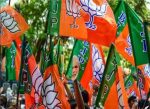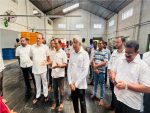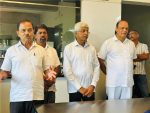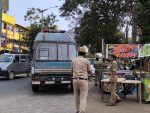
Mandatory screening, drug subsidies may cut newborn deaths due to rare diseases
Team Udayavani, Feb 27, 2019, 6:54 AM IST

New Delhi: India could significantly reduce the deaths of newborn babies caused by rare genetic diseases by making genetic screening mandatory in government hospitals and subsidising the required drugs, experts say.
While there is no formal definition for a rare disease, global health bodies say that it is characterised by three factors — the total number of people having the disease, its prevalence and non-availability of treatment.
“The government is not paying much attention to the cases of rare diseases thinking it as a rare case,” Manjit Singh, President of Lysosomal Storage Disorder Support Society of India (LSDSS), told PTI.
“However, there is a need for genetic testing laboratories in the every government hospitals to understand the real problem,” he added.
A newborn screening (NBS) test looks for various developmental, genetic, and metabolic disorders in the newborn.
This allows steps to be taken before symptoms develop. Most of these illnesses are extremely rare, but can be treated if caught early.
India currently has over 8,000 patients with rare diseases, which includes genetic disorders like rarest of rare ones such as Hunter Syndrome, Gaucher Disease and Fabry’s Disease.
While Fabry’s Disease interferes with the body’s ability to break down a specific fatty substance, Hunter Syndrome is a serious genetic disorder that interferes with the body’s ability to break down specific mucopolysaccharides.
Currently, all rare diseases get diagnosed at a much later stage when treatments are not much effective.
The early diagnosis of such disorders during birth can be much useful in terms of medication enabling the patients to lead a normal life.
According to the Organisation for Rare Diseases India (ORDI), there are 7,000 known rare diseases in India with a total of 70 million rare diseases patients in India.
Currently, only one in 20 Indian patients get diagnosed with a rare disease.
Prasanna Shirol, Founder Director of ORDI, said that almost half of rare disease patients in India are children, an important fact that often does not get highlighted enough.
“We urgently need national and state policies that address the unique requirements of the rare disease community and enable them to lead lives of dignity and self-worth,” Shirol told PTI.
“We also need institutions like corporates, schools and colleges to create a more inclusive environment for rare disease patients,” he added.
Doctors said that there is also a need for the government to negotiate with the pharmaceutical companies and subsidise the medicines used in rare diseases as they are priced extremely high.
According to the health advocacy groups fighting for the cause of rare diseases in India, the medicines to treat such diseases range anywhere between Rs 1 lakh to Rs 50 lakh per month.
In 2017, the National Policy for Treatment of Rare Diseases (NPTRD) was announced by the Indian government with a corpus of Rs 100 crore to provide financial assistance for the treatment of rare disease patients.
However, in November last year, the health ministry put on hold the policy and the corpus amount, saying the focus was currently on communicable and non-communicable diseases.
Since then there have been several representations to the central government from organisations including LSDSSI seeking reinstating of the policy and funds to support the patients.
ORDI said that it takes an average of seven years to diagnose a rare disease due to lack of awareness and scientific facts.
Around 80 per cent of the rare diseases have identifiable genetic origin and 30 per cent of the patients die before reaching the age of 5 years.
National bodies working for the well being of patients with rare diseases have urged the government for setting up genetic screening laboratories in every government hospitals so that newborns can be screened if they have any life threatening genetic disorder.
At present, only a few top government hospitals such as the All India Institute of Medical Sciences and Post Graduate Institute of Medical Education and Research, Chandigarh apart from the private hospitals have the newborn screening tests, making it extremely costly and unaffordable for the people from low-income group, a strata from where genetic disorder cases are frequent.
Sunita Bijarnia, Clinical Geneticist, Gangaram Hospital said the decades of research for developing a medicine for rare disease coupled with not enough demand due to limited patients are the reasons behind high cost of the drugs.
“Until the government negotiates with the pharmaceutical companies and subsidises the drugs for genetic rare disorders the problem cannot be solved. And it is of utmost importance to give medicines to such patients to enabling them to lead a normal life,” she told PTI.
Bijarnia said that unlike India several nations such as Australia and Philippine have a better system where the government pays for every medical expenses of rare diseases. This helps in the early diagnosis of such medical cases.
Udayavani is now on Telegram. Click here to join our channel and stay updated with the latest news.
Top News
Related Articles More

Surgical options for Parkinson’s disease

Breast cancer to cause a million deaths a year by 2040: Lancet commission

Will to resist temptations, achieve goals more trustworthy than using apps, study finds

Govt directs e-commerce firms to remove drinks, beverages from ‘health drinks’ category

Experiencing abuse, neglect as child linked to lifelong ill-health: Study
MUST WATCH
Latest Additions

Mamata Banerjee responsible for Murshidabad violence: BJP

Udupi: Cong candidate Jayaprakash Hegde embarks on campaign tour

HC directs implementation of measures suggested by expert panel to improve medical services in Delhi

Jayaprakash Hegde calls for action on unfulfilled promises by central govt

Mangaluru: BJP, Cong workers engage in verbal spat near Sai baba temple
























